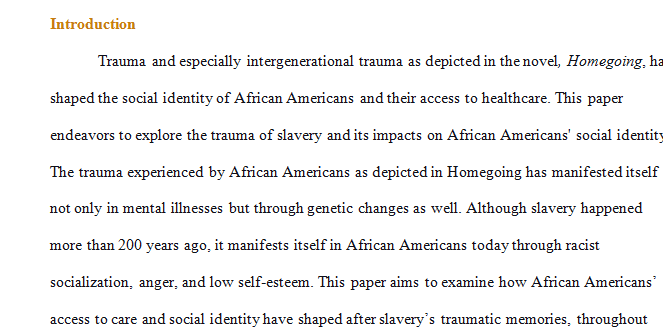Legacies of U.S. Slavery
Final Research Paper on Legacies of U.S. Slavery
Final Research Paper Prompt and Checklist:Legacies of U.S. Slavery
For the final paper, you must develop your own prompt, or research question and topic, and write a 6-7-page research paper based on Homegoing that engages with the overarching theme of the class—the legacies of U.S. slavery.You will want to pay close attention to formulating clear questions from the outset that your paper will explore and answer. The following are the possible approaches for developing your research paper topic:
Literary Interpretation:the first option is to write a literary interpretation of Homegoing on a major theme in the book (e.g. trauma, family conflict, natal alienation, etc.) and analyze what you think the book is saying about this theme and how it connects to the legacies of slavery.This type of paper would illustrate and explain what the novel is saying about this theme, and it would be a research paper about the novel.
Theme Analysis:alternatively, you could choose the same theme in the novel, e.g. trauma and the history of slavery, and write a research paper that discusses this subject outside of the novel, synthesizing your research to write about this subject more broadly (or in a different way than the novel; for instance, there is a lot of research on trauma and slavery in the social sciences, so you could write a social science research paper); this type of paper would not be a literary interpretation but an issue paper, and it would only use the novel as a frame, or jumping-off point, for an in-depth discussion of its subject. If you choose this approach, you should also discuss how this theme relates to the overall course theme, the legacies of slavery.
Historical Analysis:Another option is to take up an historical subject, issue, or figure featured in the novel and write a research paper that explores this subject and how it relates to the legacies of U.S. slavery.Possible examples might be the war on drugs, the convict-lease system, the Great Migration, passing, W.E.B. Du Bois, but there are countless other possibilities as well, so don’t limit yourself to these. The basic requirement for this approach is that the historical detail, subject, issue, or figure should come from the novel, even if it’s only a small detail, and have something to do with the legacies of slavery.
Source requirements:in addition to working with your primary source, Homegoing, you must also research, read, incorporate, and cite three secondary sources, which you will find via De Anza library online resources and the Internet. Two sources must be peer-reviewed (either a peer-reviewed article or a book chapter on your chosen topic) and one must be non-peer-reviewed (e.g., a newspaper or magazine article you find online). The goal in requiring these two different types of sources is that we learn the difference between them. A peer-reviewed article, as we know, is an essay that appears in an academic journal (not a newspaper or magazine) and has been through a rigorous process of editorial evaluation by specialists in a particular field. It represents the best research practices in this field, and it is typically 20-30 pages in length. You should use articles (and all of your secondary source material) to develop your paper’s argument and provide context and evidence for your analysis. The most useful databases to consult in the De Anza library’s online catalogue to find peer-reviewed sources are Academic Search Premier and Literature Resource Center, but I would encourage you to range beyond these as well.
All topics and secondary sources must receive formal approval by me in individual conferences, and you are responsible for notifying me of any change in your topic or research materials.
Solution preview for the order on Legacies of U.S. Slavery
APA
2695 words
